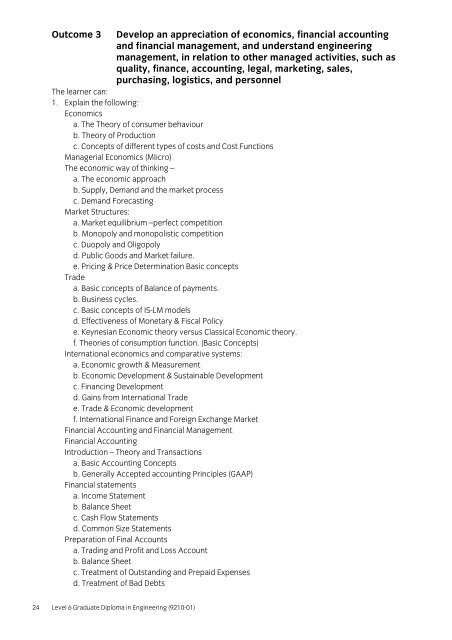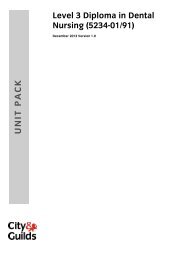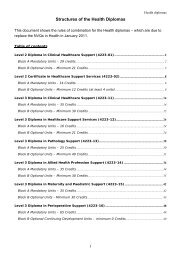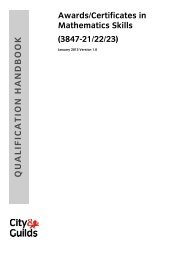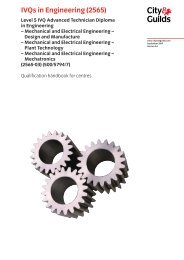Level 6 Graduate Diploma in Engineering (9210-01) - City & Guilds
Level 6 Graduate Diploma in Engineering (9210-01) - City & Guilds
Level 6 Graduate Diploma in Engineering (9210-01) - City & Guilds
You also want an ePaper? Increase the reach of your titles
YUMPU automatically turns print PDFs into web optimized ePapers that Google loves.
Outcome 3 Develop an appreciation of economics, f<strong>in</strong>ancial account<strong>in</strong>g<br />
and f<strong>in</strong>ancial management, and understand eng<strong>in</strong>eer<strong>in</strong>g<br />
management, <strong>in</strong> relation to other managed activities, such as<br />
quality, f<strong>in</strong>ance, account<strong>in</strong>g, legal, market<strong>in</strong>g, sales,<br />
purchas<strong>in</strong>g, logistics, and personnel<br />
The learner can:<br />
1. Expla<strong>in</strong> the follow<strong>in</strong>g:<br />
Economics<br />
a. The Theory of consumer behaviour<br />
b. Theory of Production<br />
c. Concepts of different types of costs and Cost Functions<br />
Managerial Economics (MIicro)<br />
The economic way of th<strong>in</strong>k<strong>in</strong>g –<br />
a. The economic approach<br />
b. Supply, Demand and the market process<br />
c. Demand Forecast<strong>in</strong>g<br />
Market Structures:<br />
a. Market equilibrium –perfect competition<br />
b. Monopoly and monopolistic competition<br />
c. Duopoly and Oligopoly<br />
d. Public Goods and Market failure.<br />
e. Pric<strong>in</strong>g & Price Determ<strong>in</strong>ation Basic concepts<br />
Trade<br />
a. Basic concepts of Balance of payments.<br />
b. Bus<strong>in</strong>ess cycles.<br />
c. Basic concepts of IS-LM models<br />
d. Effectiveness of Monetary & Fiscal Policy<br />
e. Keynesian Economic theory versus Classical Economic theory.<br />
f. Theories of consumption function. (Basic Concepts)<br />
International economics and comparative systems:<br />
a. Economic growth & Measurement<br />
b. Economic Development & Susta<strong>in</strong>able Development<br />
c. F<strong>in</strong>anc<strong>in</strong>g Development<br />
d. Ga<strong>in</strong>s from International Trade<br />
e. Trade & Economic development<br />
f. International F<strong>in</strong>ance and Foreign Exchange Market<br />
F<strong>in</strong>ancial Account<strong>in</strong>g and F<strong>in</strong>ancial Management<br />
F<strong>in</strong>ancial Account<strong>in</strong>g<br />
Introduction – Theory and Transactions<br />
a. Basic Account<strong>in</strong>g Concepts<br />
b. Generally Accepted account<strong>in</strong>g Pr<strong>in</strong>ciples (GAAP)<br />
F<strong>in</strong>ancial statements<br />
a. Income Statement<br />
b. Balance Sheet<br />
c. Cash Flow Statements<br />
d. Common Size Statements<br />
Preparation of F<strong>in</strong>al Accounts<br />
a. Trad<strong>in</strong>g and Profit and Loss Account<br />
b. Balance Sheet<br />
c. Treatment of Outstand<strong>in</strong>g and Prepaid Expenses<br />
d. Treatment of Bad Debts<br />
24 <strong>Level</strong> 6 <strong>Graduate</strong> <strong>Diploma</strong> <strong>in</strong> Eng<strong>in</strong>eer<strong>in</strong>g (<strong>9210</strong>-<strong>01</strong>)


